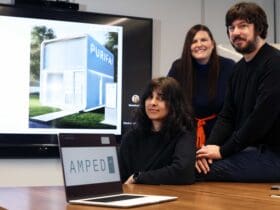Four Welsh vineyards have joined in a collaborative project to look at ways of delivering innovative solutions to decarbonisation and improving the efficiency of Welsh Vineyards through reducing the use of synthetic chemicals.
Supported by the Welsh Government’s Decarbonisation and Covid Challenge Fund, the project’s objective was to increase knowledge and understanding of disease control and prevention methods in vineyards across Wales. The project’s outputs will help to reduce future use of, and reliance on, synthetic chemicals.
Four Welsh vineyards participated, Ancre Hill Estates, Gwinllan Conwy Vineyard, Gwinllan Hebron Vineyard and Sticle Vineyard. All vineyards are different in size and locations across Wales and with varying elevations.
Speaking about the project and its benefits for a sustainable future for wine production in Wales, Richard Morris, Project Manager and co-owner of Ancre Hill Estates, said:
“The prime objective of the project was to look at reducing the use of synthetic chemicals in Welsh Vineyards but alongside that how we could improve operating efficiencies in our vineyards leading to greater profitability and job creation in the Welsh Wine Industry.”
“Across the 2022 growing season sample vines were selected, predominately Pinot Noir, to monitor the impact of a range of disease management techniques. The participating vineyards were provided with bespoke monitoring protocols that set out the viticulture management practices to be followed, together with the monitoring and data collection required throughout the 2023 growing season. Vines were monitored and data collected at key growth stages. All data gathered was then analysed to determine the impact on the vineyards relating to the application of pesticides.”
The project was multifaceted and strove to provide information and data to support both active and preventative disease control within the participating vineyards. It also focused on peer-to-peer knowledge, helping up-skill and boost confidence in the use and efficacy of alternatives to synthetic chemicals, now and in the future.
The project was supported through advice and information in several ways including group and one-to-one support during the project together with post project interviews with each of the participating vineyards to understand the impact and benefits. Weather sensors were installed to provide live data in relation to temperature, humidity and rainfall, all of which are critical in the fight against mildew disease. The data was crucial for the development of the IT disease monitoring prototype that was delivered as part of the project, which provided timely text and email notifications to vineyard owners for Downy & Powdery mildew risk and potential frost risks.
The vineyards involved all apply different grape growing methods, including Organic, Biodynamic, conventional and Regenerative/no spraying. The variety of Welsh vineyards within the project has allowed for a valuable broad look at existing practices and opportunities for synthetic pesticide use in different environments and under a range of management approaches.
Leading vineyard and winery consultants, Vinescapes, managed the project. Commenting on the data collection and analysis of the results Paula Nesbitt said:
“We were delighted to be involved in this project and thought that we could really add value, especially with the technical viticulture elements. There has been quite a bit of work done globally looking at reducing the use of pesticides in vineyards but there’s not been anything specifically in Wales, and it does have its own very unique climate. Vineyards do have a significant issue with mildew disease and we really wanted to support the Welsh Wine Industry.”
“The data collection and analysis is critical as this drives viticulture decisions and supports a balanced vineyard. Data can be the difference between vineyard success and failure. It is also one of the most important factors in managing the reduction of synthetic chemicals in the vineyard.”
Talking of the next steps of the project, Richard Morris said:
“This project is in its infancy. We hope to continue it over the next two to three seasons with continued support from the Welsh Government, which has been vital, as well as wider participation and collaboration with the other Welsh Vineyards.”
“We need further research but I do believe that the initial findings in the report to date are going to help Welsh Vineyards significantly improve efficiency and operating practices. This will also assist the Welsh Vineyards through the post Covid period, helping their economic recovery and driving continued growth for the Welsh Wine Industry.”
Fintan O’Leary, Managing Director of Levercliff who deliver the Welsh Drinks Cluster on behalf of the Welsh Government, commented:
“This collaborative project was a real achievement for Welsh wine, and we were delighted to support it. Sustainability is a core aspect of the Welsh Wine Strategy, which was launched back in December, and it is in place to make sure that there are no barriers for vineyards as the sector gets bigger.”
“I regard the Welsh Vineyards as pioneers and once again they have shown that Wales can lead the way.”
Minister for Rural Affairs, North Wales, and Trefnydd, Lesley Griffiths said:
“I’m pleased to see the Wine Industry in Wales working together to look at ways in which it can deliver solutions to reduce the use of pesticides, support decarbonisation and improve the efficiency of vineyards.”
“Welsh Vineyards are producing beautiful wines and continue to build their made-in-Wales name both at home and abroad.”









Leave a Reply
View Comments